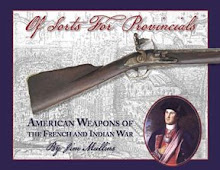Although conveniently near the state operated lead mines near Fort Chiswell in modern Wythe county- the Revolutionary War era families of Southwest Virginia frequently had dangerous shortages of arms, powder, and flints; particularly after the mobilization of Virginia's 15 Continental regiments who then carried large quantities of arms outside of the State. A significant portion of these arms would never return to Virginia.
[Col. William Preston to Governor Henry July 8th 1778.]
"... The Inhabitants of both mostly collected into Forts, and we are sorry to find that numbers of Our effective Men are not armed, which we can only account for from the Number of Firelocks that were purchased in these parts, for the use of the State & the People being prevented from again supplying themselves, as the Importation from Germany fails the Gunsmiths being mostly engaged to work for the Publick. This dificiency has induced us to Apply to your Excellency to get an order for one hundred & fifty riffles, or Muskets for each County as they can be spared from the publick magazine. on any plan your Excellency shall think proper to adopt in the distribution, should you grant our request, we propose sending down from the Arms We forbear particularizing the Murders committed by the Enemy tho they are many at present as it is a desagreeable subject.
And subscribe Your Excellencys Most Obt Hble Servts
Wm Fleming.
Wm Preston."
Preston's request for additional firearms seems to have fallen on deaf ears, but plans to forward ammunition had already been set in motion.
Governor Patrick Henry to Col. Wm Preston
"Wmsburg June 27th 1778.
Sir: I am favor'd with yours by Mr. Madison & Send by him £1,500 for furnishing provisions I also direct Colo Southall of Henrico to hire a Waggon & send in it 1,500lb powder of the best rifle kind
& 5,000 Gun flints. This powder & the Flints to be lodged at
Colo Flemings & to be for the general use of the So Western
Frontier."
After retiring from Virginia Provincial military service Fleming resumed his civilian life as a physician and land speculator, marrying and building a home for himself in what would become Roanoke, Virginia by 1768.
Fleming's home from Colonel William Fleming of Botetourt, by Edmund P. Goodwin
Fleming wrote Governor Henry that "I have built a house of squared timber 16 feet by 14, sufficient to hold any Stores necessary to this quarter." adding that "Six Men I thought necessary to keep here as a gard for our little magazine." Fleming's personal magazine appears to have been an above ground building near his personal home, unlike the in ground powder magazines he would have been familiar with at Fort Ligonier in Pennsylvania and Fort Chiswell.
Fleming acknowledged receipt of the gunpowder and flints in July:
[Fleming to Henry ]July 19 1778]
"The 16th Inst I received 1462 lbs. of G: powder and the Flints agreeable to your Excellencys orders. 38 lbs. of the Powder was lost in the Carriage up by the heads of two of the Barrels being loose, this with what was in store before makes 2909 lbs. now in my care. Colo Southal desired the Waggon to be loaded down to lessen the expence. I derected the Waggoner to take a load of Country lead left near this. I am since informed he only took the half. should your Excellency think proper the remainder might be lodged here, as there is not 100 lbs. of Lead in store...Several persons have Applied to me for G. powder, as they could not be supplied elsewhere on this occasion, I let them take some from the County store at 12/ p. lb. which I suppose will reimburse the State An Account of which I keep. Your Excellency will receive with this a request from Colo Preston & myself in behalf of Montgomery & Botetourt counties for some fire arms."
Despite being precluded from active field service as an officer by his injuries, Fleming played an active role in munition logistics and defensive planning for western Virginia during the Revolutionary war.
Worn flints from Cook's Fort, Monroe County, WVa via youtube
William Preston wrote to William Fleming that "I would be much obliged to you for 100 flints as several of my Guns are useless for want of them." [May 30, 1778]
"John Madison to Col Wm Fleming 2ZZ80 ALS
5th April 1779
My Dr Colo:
The frequent reports we have of the Hostile Intention of our Sable Neighbours is by no Means Clever, for which reason I would fain Put my Family in the best Posture of Defence I Possibly can, Say Good Sir can you spare me a Musquet or two at any Price or can you supply me with a little Amunition in case of Danger. I think you Intimated that I might have 2 or 3 Dozen of Gun Flints pray send them by Rowland for I have not one
I am with much Esteem Yr Obt Servant
John Madision." [John Madison to Fleming April 5, 1779]
In addition to ammunition, Fleming also handled small arms. In a letter to Governor Jefferson dated January 19, 1781, Fleming mentions "The Waggoner who took up the Salt to Washington County brings down a Chest of Arms, containing thirty four Firelocks that want repairing, with Six that are in order, retained for the use of the Militia makes up the compliment of Arms committed to my care..." (Works of Jefferson Vol. 3 pages 407-8).
For further information on Fleming I highly recommend Colonel William Fleming of Botetourt, by Edmund P. Goodwin and William Fleming, Patriot, by Clare White.




.png)
